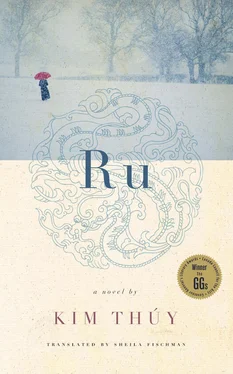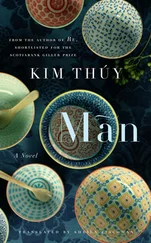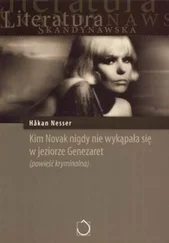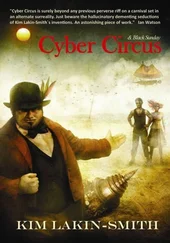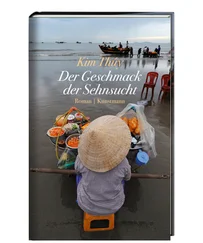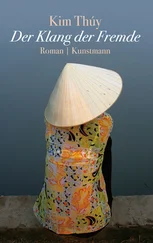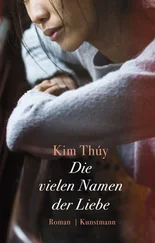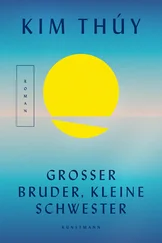It was thanks to the GIs that my step-uncle Six was able to buy his own passage and those of his wife, my aunt Six, and his very small daughter on the same boat as us. The parents of that step-uncle became very rich thanks to ice. American soldiers would buy entire blocks one metre long and twenty centimetres wide and thick to put under their beds. They needed to cool down after weeks of sweating with fear in the Vietnamese jungle. They needed human comfort, but without feeling the heat of their own bodies or of women rented by the hour. They needed the cool breezes of Vermont or Montana. They needed that coolness so they could stop suspecting, for a moment, that a grenade was hidden in the hands of every child who touched the hair on their arms. They needed that cold so as not to give way to all those full lips murmuring false words of love into their ears, to drive away the cries of their comrades with mutilated bodies. They needed to be cold to leave the women who were carrying their children without ever returning to see them again, without ever revealing their last names.
Most of those children of GIs became orphans, homeless, ostracized not only because of their mothers’ profession but also because of their fathers’. They were the hidden side of the war. Thirty years after the last GI had left, the United States went back to Vietnam in place of their soldiers to rehabilitate those damaged children. The government granted them a whole new identity to erase the one that had been tarnished. A number of those children now had, for the first time, an address, a residence, a full life. Some, though, were unable to adapt to such wealth.
Once, when I was working as an interpreter for the New York police, I met one of those children, now adult. She was illiterate, wandering the streets of the Bronx. She’d come to Manhattan on a bus from a place she couldn’t name. She hoped that the bus would take her back to her bed made of cardboard boxes, just outside the post office in Saigon. She declared insistently that she was Vietnamese. Even though she had café au lait skin, thick wavy hair, African blood, deep scars, she was Vietnamese, only Vietnamese, she repeated incessantly. She begged me to translate for the policeman her desire to go back to her own jungle. But the policeman could only release her into the jungle of the Bronx. Had I been able to, I would have asked her to curl up against me. Had I been able to, I’d have erased every trace of dirty hands from her body. I was the same age as her. No, I don’t have the right to say that I was the same age as her: her age was measured in the number of stars she saw when she was being beaten and not in years, months, days.
At times, the memory of that girl still haunts me. I wonder what her chances of survival were in the city of New York. Or if she is still there. Whether the policeman thinks about her as often as I do. Perhaps my step-uncle Six, who has a doctorate in statistics from Princeton, could calculate the number of risks and obstacles she has faced.
I often ask that step-uncle to do the calculation, even if he has never calculated the miles travelled every morning for one whole summer to take me to my English lessons, or the quantity of books he bought me or the number of dreams he and his wife have created for me. I allow myself to ask him many things. But I’ve never dared to ask if it was possible for him to calculate the probability of survival for Monsieur An.
Monsieur An arrived in Granby on the same bus as our family. In winter and summer alike, Monsieur An stood with his back against the wall, and one foot on the low railing, holding a cigarette. He was our next-door neighbour. For a long time, I thought he was mute. If I ran into him today, I would say that he’s autistic. One day his foot slipped on the morning dew. And bang, he was spread out on his back. BANG! He cried out “BANG!” several times, then burst out laughing. I knelt down to help him get up. He leaned against me, holding my arms, but didn’t get up. He was crying. He kept crying and crying, then stopped suddenly, and turned my face towards the sky. He asked me what colour I saw. Blue. Then he raised his thumb and pointed his index finger towards my temple, asking me again if the sky was still blue.
Before Monsieur An’s job was to clean the floor of the rubber-boot plant in Granby, he’d been a judge, a professor, graduate of an American university, father and prisoner. Between the heat in his Saigon courtroom and the smell of rubber, for two years he had been accused of being a judge, of sentencing Communist countrymen. In the re-education camp, it was his turn to be judged, to position himself in the ranks every morning with hundreds of others who’d also been on the losing side in the war.
That camp surrounded by jungle was a retreat for the prisoners to assess and formulate self-criticisms, depending on their status — counter-revolutionary; traitor to the nation; collaborator with the Americans — and to meditate on their redemption while felling trees, planting corn, clearing fields of mines.
The days followed one another like the links of a chain — the first fastened around their necks, the last to the centre of the earth. One morning, Monsieur An felt his chain getting shorter when the soldiers took him out of the ranks and made him kneel in the mud before the fleeting, frightened, empty gazes of his former colleagues, their bodies barely covered with rags and skin. He told me that when the hot metal of the pistol touched his temple, in one last act of rebellion he raised his head to look at the sky. For the first time, he could see shades of blue, all equally intense. Together, they dazzled him almost to the point of blindness. At the same time, he could hear the click of the trigger drop into silence. No sound, no explosion, no blood, only sweat. That night, the shades of blue that he’d seen earlier filed past his eyes like a film being screened over and over.
He survived. The sky had cut his chain, had saved him, freed him, while some of the others were suffocated to death, dried up in containers without having a chance to count the blues of the sky. Every day, then, he set himself the task of listing those colours — for the others.
Monsieur An taught me about nuance. Monsieur Minh gave me the urge to write. I met Monsieur Minh on a red vinyl bench in a Chinese restaurant on Côte-des-Neiges where my father worked as a delivery man. I did my homework while I waited for the end of his shift. Monsieur Minh made notes for him about one-way streets, private addresses, clients to avoid. He was preparing to become a delivery man just as seriously, just as enthusiastically, as he’d studied French literature at the Sorbonne. He was saved not by the sky but by writing. He had written a number of books during his time in the re-education camp — always on the one piece of paper he possessed, page by page, chapter by chapter, an unending story. Without writing, he wouldn’t have heard the snow melting or leaves growing or clouds sailing through the sky. Nor would he have seen the dead end of a thought, the remains of a star or the texture of a comma. Nights when he was in his kitchen painting wooden ducks, Canada geese, loons, mallards, following the colour scheme provided by his other employer, he would recite for me the words in his personal dictionary: nummular, moan, quadraphony, in extremis , sacculina, logarithmic, hemorrhage — like a mantra, like a march towards the void.
Each of us had been saved in a different way during Vietnam’s peacetime or postwar period. My own family was saved by Anh Phi.
It was Anh Phi, teenage son of a friend of my parents, who found the pack of gold taels my father had flung from our third-floor balcony during the night. The day before, my parents had told me to pull on the bit of rope that ran alongside the corridor if one of the ten soldiers living in our house should come up to our floor. My parents had spent hours in the bathroom clearing out the thin gold sheets and the diamonds hidden under the tiny pink and black tiles. Then they wrapped them carefully in several layers of brown paper bags before throwing them into the dark. The package had landed as expected in the debris of the demolished house that once belonged to the former neighbour across the way.
Читать дальше
